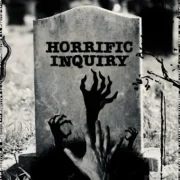The Donald Trump Cinematic Universe: What Do His Movies Say About Him?
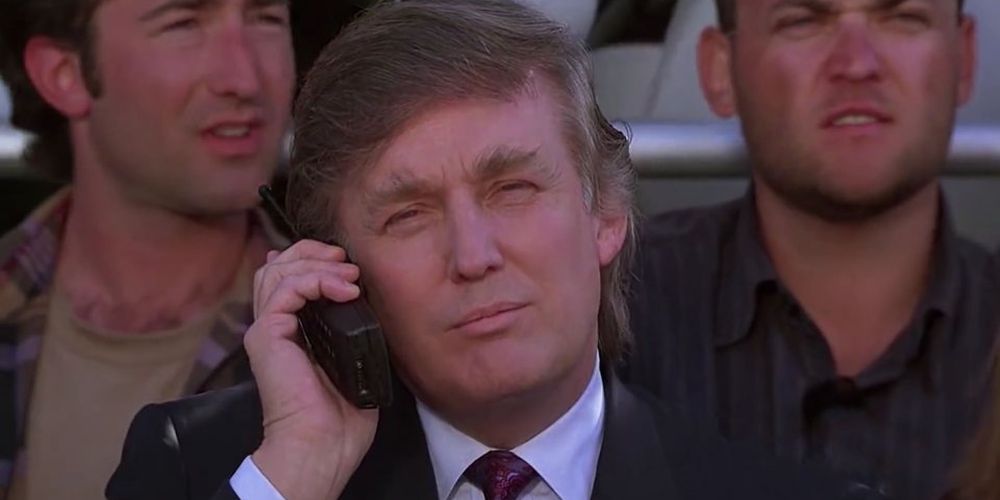
Alistair is a 25 year old writer based in Cambridge.…
In two months time, the world could have already adjusted to the news that Donald Trump has been named the 45th President of the United States.
Trump’s entire presidential platform has been built on two things: the first is a disrespect for taste and decency, building an entire campaign around gaffes that would see any other politician deemed unfit to be a part of the establishment, let alone be crowned leader of the free world. The second is an attempt to ground himself in traditional Republican values, frequently citing Ronald Reagan (and Reaganomics) as a spiritual predecessor.
Like Reagan, Trump will be the second US president with a background in acting. I’m not talking about his delusional willingness to believe his own lies with a c*cksure confidence, instead, I’m talking about his movie cameos across the years, which all help to paint a picture of a man the rest of the world is begging not to be elected in a few weeks time.
A Shameless Populist
His self-styled persona as a “working class millionaire” is fully certified in his choice of movie cameos, in films which shamelessly court mainstream favour and seldom dare to appear critically respectable. Donald Trump is a politician whose entire style is based around disregarding the expert elite and playing to the masses. Could this distrust of experts be partly due to the universal damning each feature film he starred in received by critics?
After several TV cameos, his first movie cameo came in the 1990 Razzie award winner Ghosts Can’t Do it. He appears to be playing a stock businessman character, although a cursory glance at IMDb informs that this is his first of many self-aggrandising cameos as himself.
This widely maligned picture casts Bo Derek as a woman who has to kill a man so the ghost of her former husband can inherit his body. Trump’s cameo appears in a boardroom meeting, as he faces off against the leading lady with just a few lines of dialogue; it may be toned down and restrained, but it still represents what we now know as being “textbook Trump”.
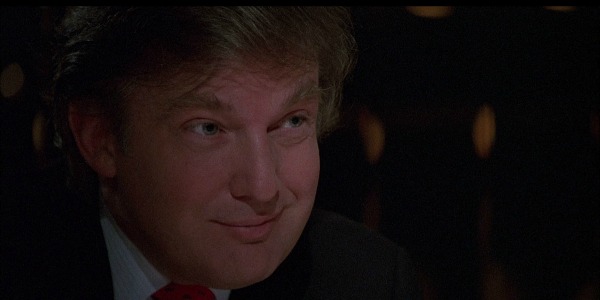
Derek aggressively puts down all the men around the business table, except for Trump, whom she inexplicably calls “too pretty to be bad”. Donald Trump’s smarmy egotism is even worse when toned down into a serious acting performance that extends to little more than 10 seconds. He responds to Derek’s flattery with little more than a “you noticed”.
Considering the twin problems that are Trump’s opinions of women in the business world and his likely planet-destroying ego, it makes perfect sense for him to cameo as not only the sole man willing to stand up to the only woman in the boardroom, but one whose dashing good looks make her unable to give criticism. As this film was produced in the 80’s, regressive gender politics aren’t uncommon; it is just bizarre to see Trump’s own opinions have remained constant ever since.
Donald Trump’s second appearance on the big screen was even shorter than the masterclass of acting that was his debut. In Home Alone 2: Lost in New York, Kevin McAllister (Macaulay Culkin) is stranded in the Big Apple, with Trump’s cameo acting solely to give our protagonist directions. This role is definitive proof Trump is not fit to be president.
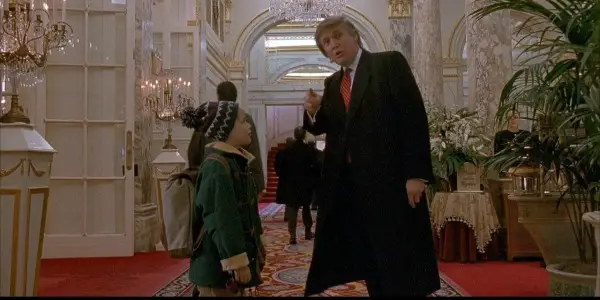
Sure, he preaches extensively about the need to protect future generations throughout his presidential platform, but when faced with a young kid walking around New York on his own, he just leaves him to wander unaccompanied. This is the selfish Trump the media always warns the public about, proving he doesn’t care about the well being of America’s youth. Sad!
Calculated Cameos
In all seriousness, Donald Trump cameos fall into two categories. There are the self-aggrandising appearances highlighting his fame, wealth and (apparently) physical attributes. His TV cameos most frequently fall into this category; his recurrent sitcom appearances throughout the 90’s acted to reinforce his status as a handsome, alpha male millionaire, with brief turns in shows ranging from The Nanny to Sex and the City all acting upon this.
His other cameos, a far smaller category, aim to show the humility behind his hard hitting public persona. In the 1994 Little Rascals movie, he cameos as the father of Waldo, offering a brief but encouraging speech informing his son how proud he is to be his father. It is a far better demonstration of family values than his real life persona, where his relationship with one of his daughters is defined by how incestuous it frequently appears.
The major reason Donald Trump’s movie cameos are so interesting to talk about, despite totalling less than three minutes in total length, is because they seem so alien to his actual movie tastes. Sure, he has worked with Woody Allen (an uncredited cameo in Celebrity) and appeared briefly in Zoolander, but everything else was a critical disaster. When he’s gone on the record about his own personal tastes, they couldn’t be more dissimilar from his persona.
Speaking to documentarian Errol Morris about his favourite film, he slowly, intelligently, discussed his personal relationship with Citizen Kane – after all, he is one of the only people on the planet who can fully empathise with the story. His uncharacteristic clarity when discussing Orson Welles’ film, complete with an equally uncharacteristic self-awareness to the parallels between Kane and himself, makes for oddly surreal viewing, not least from a candidate who will go at great lengths to avoid speaking the truth.
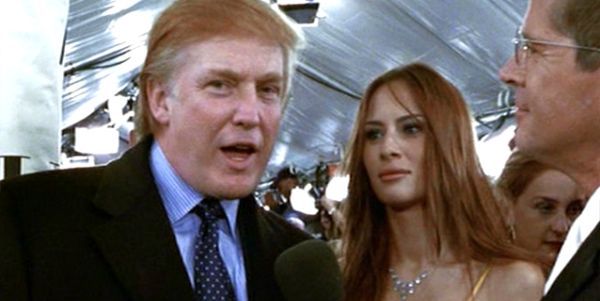
Elsewhere, he has listed his other favourite movies as The Godfather, The Good The Bad and The Ugly, Goodfellas and Gone With the Wind; undisputed American classics through and through. The only problem is trying to work out whether or not these accurately convey Trump’s tastes. A 1997 Business Insider profile highlighted he loved watching JCVD classic Bloodsport on his private jet, whilst he has gone on the record earlier this year as loving Michael Bay’s Benghazi opus 13 Hours.
With his shamelessly populist approach to politics, it seems more likely the public Trump, the man who is mad as hell and isn’t going to take it anymore, would love the same critically derided entertainment as the masses. The private Trump, the one who understands his persona couldn’t be culturally and economically further from the working class Americans he dreams of representing, is arguably more attuned to the artsier and less populist works of art than the common man would be.
Conclusion
In examining his movie tastes, Donald Trump remains as profound an enigma as he does when giving differing opinions on controversial policies within moments. It isn’t impossible for him to have varied tastes that ensure he loves the works of Orson Welles and Jean Claude Van Damme equally, but when examining his big screen and small screen work, it is highly surprising to see that he has a keen interest in cinema history given the films he prefers to appear in.
As a successful businessman, he didn’t need to perform in any movies in order to further his career; the fact he elected to appear solely in small, inconsequential cameos couldn’t be further from what we know about the man and his egotistical desire to be the constant centre of attention. Yet oddly, each cameo acts as a paradox. They are small roles, but they all act to flatter his sense of self worth as a businessman, something which is instantly detracted from due to the poor quality of the movie he is being engulfed in.
Trump would only appear in a project if it allowed him to look good, regardless of whether the film itself was of an esteemed quality. Trump may have a passion for cinema, but it will always come second to his passion for Donald Trump. He may be the only cinephile with a track record of starring in bad movies for calculating, ego-driven reasons. Why would he want to help create art when he can create an advert for himself?
Is it fair to judge political personas based on their movie tastes?
Does content like this matter to you?
Become a Member and support film journalism. Unlock access to all of Film Inquiry`s great articles. Join a community of like-minded readers who are passionate about cinema - get access to our private members Network, give back to independent filmmakers, and more.
Alistair is a 25 year old writer based in Cambridge. He has been writing about film since the start of 2014, and in addition to Film Inquiry, regularly contributes to Gay Essential and The Digital Fix, with additional bylines in Film Stories, the BFI and Vague Visages. Because of his work for Film Inquiry, he is a recognised member of GALECA, the Gay & Lesbian Entertainment Critics' Association.








